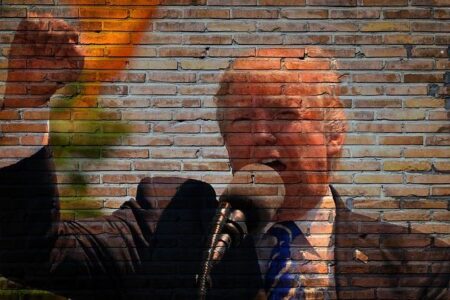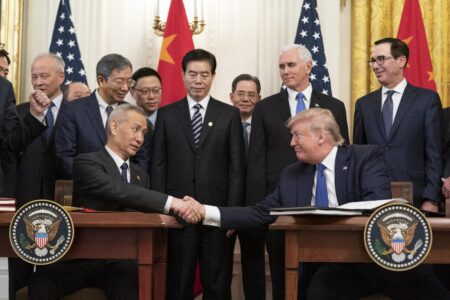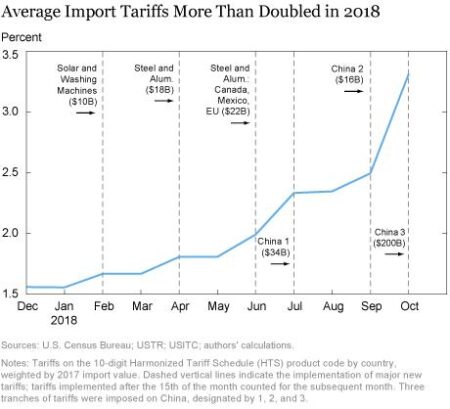As the US intensifies its trade war strategies, Australia may face significant repercussions. With supply chains interlinked and economic dependencies on the US, the next round could strain both trade relationships and domestic industries.
Browsing: globalization
Canada and the European Union have announced retaliatory tariffs in response to recent U.S. trade policies, further escalating tensions in the ongoing trade war initiated by the Trump administration. The new tariffs target key industries, highlighting global trade frictions.
As Trump tariffs reshape global trade dynamics, India stands poised to excel in Asia. With a burgeoning domestic market, a strong manufacturing base, and strategic alliances, India is uniquely positioned to leverage these tensions for economic growth and opportunity.
Former RBI Deputy Governor has suggested that Trump’s tariffs on India could offer unexpected opportunities for local industries to strengthen and innovate. The measures, while challenging in the short term, may ultimately lead to greater self-reliance.
Elon Musk’s growing political clout may provide a strategic advantage in penetrating the Indian market. With aspirations for Tesla’s expansion and Starlink’s deployment, Musk’s ability to navigate India’s complex regulatory landscape could be pivotal.
In response to U.S. tariffs imposed by the Trump administration, Canadians are strategizing innovative solutions to mitigate economic impacts. From diversifying trade partnerships to advocating local production, these efforts reflect a resilient spirit in the face of protectionism.
Many Chinese observers perceive a cultural revolution unfolding in the United States, marked by heightened political polarization, social justice movements, and shifting norms. This evolving landscape prompts reflections on their own societal dynamics and values.
As US-China trade tensions escalate, African nations find themselves at a crossroads. With both superpowers seeking influence, countries must navigate complex trade dynamics, potentially reshaping their economies and diplomatic relations in the process.
As U.S. tariffs on various imports take effect, Mexico, Canada, and China respond with retaliatory measures, targeting American goods. This escalation raises concerns over escalating trade tensions and potential impacts on the global economy.
India may avoid the Trump administration’s tariffs set to begin on April 2, according to sources. Negotiations are ongoing, focusing on trade imbalances and tariffs on Indian goods, potentially allowing for exemptions or reduced rates.
In response to potential tariffs under the Trump administration, Sony and Suntory are proactively building stockpiles in the US. This strategic move aims to mitigate supply chain disruptions and ensure continued access to the American market amidst rising trade tensions.
Javier Milei’s recent visit to Washington underscores his commitment to promoting freer trade between the U.S. and Argentina. Such a shift could enhance economic ties, boost exports, and foster investment, potentially benefiting both nations’ economies.
The Associated Press reports that Trump’s tariffs on Mexico, Canada, and China target a range of goods, including agricultural products, electronics, and vehicles. This trade policy aims to bolster domestic industries but risks escalating tensions and consumer prices.
In a significant move, President Trump has announced a 10% increase in tariffs on Chinese imports, escalating trade tensions between the two countries. This strategy aims to protect U.S. industries but may further complicate global supply chains and consumer prices.
European Commission President Ursula von der Leyen has announced that the EU and India aim to finalize a comprehensive free-trade agreement by the end of this year. This pact seeks to enhance economic ties and boost trade between the two regions.
India and Latin America are strengthening economic ties to diversify trade partnerships. By enhancing cooperation in sectors like technology and agriculture, both regions aim to reduce dependency on traditional markets and foster mutual growth.
As the U.S. imposes tariffs and tightens trade restrictions, China is strategically opening its markets, seeking greater global economic integration. This contrasting approach may reshape international trade dynamics, highlighting a pivotal shift in global economic policy.
Spain’s economy is experiencing a remarkable boom, driven significantly by migration. As skilled migrants contribute to various sectors, the data suggests that embracing diversity promotes growth, challenging the notion that xenophobia benefits national prosperity.
Apple’s recent focus on India signals a strategic shift in its global operations. As the company seeks to diversify its supply chain and tap into the growing Indian market, it underscores the country’s rising importance in the tech landscape.



















